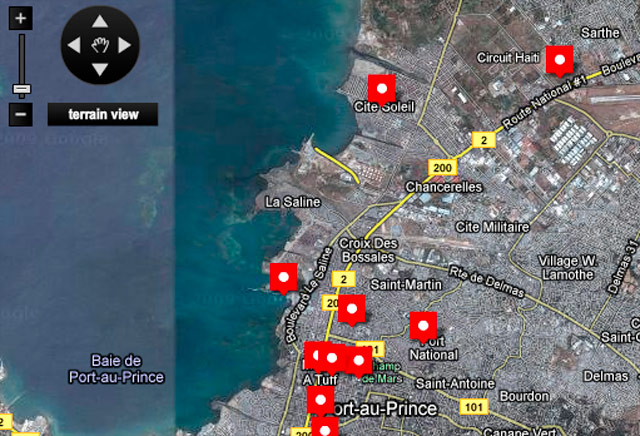Survivors still being pulled from Haiti rubble
- Student found after rescuers alerted via text; more people thought alive in school
- Reports of looting in Haiti as desperation grows
- U.S. Air Force plane drops 55,000 pounds of bottled water and food on Monday
- As of Sunday, more than 60 people had been found alive by rescue teams
Port-au-Prince, Haiti (CNN) -- Nearly a week after a massive earthquake leveled much of Haiti, rescues of victims who survived without food or water have not abated.
A CNN crew in the Haitian capital Monday was flagged to the scene as a Peruvian search-and-rescue team pulled a university student out of the remains of the flattened school. Text messages had been sent from beneath the rubble, drawing rescuers to the scene, said paramedic Clever Sobrino, who added that more trapped survivors are believed to be inside.
The student, Maxine Fallon, 23, was treated by an Israeli doctor and taken to a U.N. treatment center on the back of a CNN truck.
Fallon said she had prayed fiercely for someone to find her beneath the ruins of what was once her university. "I had hoped I would be rescued," Fallon said.
Earlier, 6-year-old Jessica Hartelin was pulled from the rubble by local residents and rushed to a field hospital set up by Israelis at a Port-au-Prince soccer field.
On Sunday, five people were rescued from the rubble of a grocery store, officials said, 24 hours after the effort to reach them began.
As of Sunday, more than 60 people had been found alive by rescue teams from the United States and other nations, Tim Callaghan of the U.S. Agency for International Development told reporters. American teams have rescued about 30 of those, he said.
Earlier Monday, several hundred Haitians broke into a damaged supply store in downtown Port-au-Prince, looting it in a sign of growing desperation since the earthquake.
 Map, pictures of damaged sites
Map, pictures of damaged sites
 Video: Aid 'cannot come soon enough'
Video: Aid 'cannot come soon enough'
 Video: Desperate for better medical care
Video: Desperate for better medical care
 Gallery: Devastation from Haiti earthquake
Gallery: Devastation from Haiti earthquake
Fights broke out among some of the looters. Young men holding two-by-fours with nails hammered into them began attacking each other.
CNN's Anderson Cooper saw one man beaten until one of his arms started bleeding.
One boy collapsed onto the street in a pool of blood, Cooper said, describing the situation as "a frenzy of looting."
Watch as Cooper carries injured boy ![]()
Police fired into the air, hoping to break up the incident. Within about an hour, and with the store entirely looted, the crowd moved to another store half a block away.
People weren't stealing food -- they were taking candles for their homes without electricity or in hopes of selling them, Cooper said. Some came along with money, buying supplies from looters -- in some cases in the hopes of selling for more somewhere else.
Other cases of looting have been reported, though generally involving smaller crowds.
See the latest developments from Haiti
Kenneth Merten, the U.S. ambassador to Haiti, said that "overall, people are very calm."
That seems to be an overwhelming task for the Haitian National Police, a force of about 9,000.
National Police Chief Mario Andresol said Monday that the department has been severely affected by the earthquake, with thousands of officers injured, killed or unaccounted for. The Port-au-Prince force of 4,000 has dropped to about 1,500 he said.
Complicating matters even further, roughly another 4,000 "bad guys" are on the run, Andresol added, after the 95-year-old, crowded National Penitentiary in the capital collapsed and the inmates escaped.
"Today, we have double work," Andresol said, adding that the police department is bringing in troops from other parts of the country. "There are not enough, so we are trying."
Bill Clinton, the former U.S. president who is the U.N. special envoy to Haiti, said Sunday that 40 percent of the Haitian police force has reported for duty since the January 12 earthquake.
Clinton arrived in the country Monday with his daughter, Chelsea. He was to meet with local officials to discuss how best to proceed with recovery operations.
Watch Clinton talk about the aid bottleneck ![]()
The U.S. military considers the security situation stable, Rear Adm. Mike Rogers, director of intelligence for the Joint Chiefs of Staff, told reporters Monday.
Rogers said stable meant the United States can carry out operations -- including search and rescue, distribution of aid, moving people in and out of the capital and flying aircraft.
Read full coverage of the earthquake in Haiti
Nothing suggests widespread disorder and panic, he said, citing the incidents of unrest as "isolated events."
The country's roads and the capital's airport were so congested that the supply lines of goods into Haiti were clogged, leaving thousands of survivors to scrounge for food and emergency aid.
A U.S. Air Force C-17 circumvented the airport congestion problem by dropping 55,000 pounds -- about 40 pallets -- of bottled water and food on Monday, the first U.S. airdrop of supplies.
But the congestion and distribution problems showed signs of easing Monday, with 180 flights passing through the airport without delays, said Gen. P.K. Keen, who is leading U.S. forces on Haiti.
During the previous day, more than 233,000 bottles of water and 140,000 meals had been distributed, not enough for the 3.5 million people affected, he said.
He predicted that the port, which was damaged in the earthquake, would be open "in some capacity" by the end of the week.
The dearth of hospital facilities also should ease soon, too, he said. Israel and Argentina, Russia, Portugal and Turkey have already sent or are sending hospitals, he said.
Doctors Without Borders reported that flights carrying medical equipment were being diverted to the Dominican Republic. Oxfam warned that fuel shortages could be on the horizon. And a volunteer at a hospital in northern Haiti said he had open beds, but no way to get patients there from Port-au-Prince.
"My surgeons are sitting around looking at each other, wondering why they came," Tim Traynor said.
Louis Belanger, a spokesman for Oxfam in Port-au-Prince, said many roads had been made passable so that trucks can deliver aid.
Jon Andrus, deputy director of the Pan American Health Organization, said doctors have seen no increase in reportable diseases within Haiti and there is no risk of a communicable disease outbreak or any other public health threat associated with bodies.
Damage to phone lines and wireless networks has made it difficult for aid agencies to communicate with each other and with the United Nations, which is in charge of coordinating relief efforts.
The head of the United Nations called for calm.
"I know that there is a frustration amongst Haitian people, but when I met them, from their faces, I have seen that they have great hope and they are a great, resilient people," U.N. Secretary-General Ban Ki-moon told CNN's Christian Amanpour on Monday.
Ban visited the nation, the poorest in the Western Hemisphere, over the weekend. "I told them that to be more patient, because [the] whole world [is] standing behind them."
Still, victims were running out of patience.
iReport: I'm alive! Messages from Haiti
"We don't have anything to eat ... we don't even have some water to drink," one woman said.
But Ban said he couldn't estimate how long it will take to get the aid already collected for Haiti flowing freely into the country.
The United Nations has 9,000 peacekeepers in Haiti -- 3,000 of them in the capital -- and Ban has requested that the U.N. Security Council increase levels by another 3,500 "to take charge of all this security, to help humanitarian assistance be delivered in a safe way."
The United States has 1,400 military forces in Haiti and another 5,000 offshore, Keen told reporters Monday. That will grow to 4,000 to 5,000 on Haiti with another 5,000 in support, he said.
Tens of thousands of food rations and sanitary packages have been handed out, Merten said.
The exhaustive work in perilous conditions earned the gratitude of people worldwide, but questions also grew about why much more wasn't being done.
Some teams available to take off to Haiti couldn't fly in due to a continuing bottleneck at Port-au-Prince's airport. Critical supplies were not making their way into the country at the needed pace.
At a U.S. medical facility, doctors were asking why they didn't have critical equipment or the ability to perform surgeries, while a field hospital set up by Israel did.
"The disaster was the quake. This is the disaster that's following in its wake," said Dr. Jennifer Furin of Harvard Medical School, referring to the lack of better medical care on the ground. Medical operations were under way off the coast on a U.S. ship for some patients who could be flown there.
iReport: Looking for loved ones?
Families were "with their loved ones who they were so excited to see alive, only now to watch them die a slow, painful death from their rotting flesh because the infections are out of control and they need surgery," Furin said.
"I've been here since Thursday. No one except the Israeli hospital has taken any of our patients," she told CNN's Elizabeth Cohen.
Cohen visited the Israeli hospital and said it was "like another world," with imaging equipment and other machinery. "They have actual operating rooms, and it's just amazing."
iReport: Earthquake's aftermath
Stories of rescues were of little comfort for Len Gengel of Deerfield Beach, Florida, whose daughter was feared trapped in the Montana Hotel, a five-story structure that pancaked in the quake.
"We need American soldiers up there rescuing our children now," Len Gengel told Merten on CNN. "Time is of the essence. I beg you." Merten said he would do all he could.
The United States was conducting medical operations on the USS Carl Vinson off the Haitian coast.
At the request of the military, Dr. Sanjay Gupta, CNN's chief medical correspondent and a neurosurgeon, was the lead surgeon in an operation on a 12-year-old Haitian girl rescued by the U.S. Coast Guard.
A fragment of concrete had penetrated the girl's brain. "They did not have a neurosurgeon in the area," Gupta said.
The surgery was successful, and "the girl is going to do great," he said.
Watch Gupta give an update on the operation ![]()
The U.S. Navy hospital ship Comfort was due within 48 hours, Gupta said.
But only a limited number of patients can be flown out to the ships. A more advanced field hospital was needed to save lives.
No overall death toll has been declared; estimates range from 100,000 to 150,000 in Port-au-Prince alone.
The U.S. State Department has confirmed the deaths of 24 Americans. Approximately 25 others are presumed to be dead, but those deaths have not been confirmed, the State Department said Monday.
Most of the bodies that once lay in the streets of Port-au-Prince have been moved. Many were dumped into huge pits. Most of the dead will never be identified.
CNN's Anderson Cooper, Susan Candiotti, Rich Phillips, Arthur Brice, Eric Marrapodi and Chris Lawrence contributed to this report.








